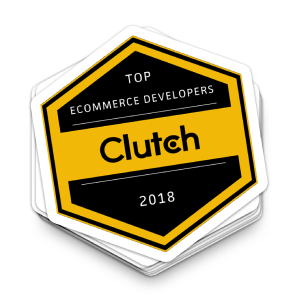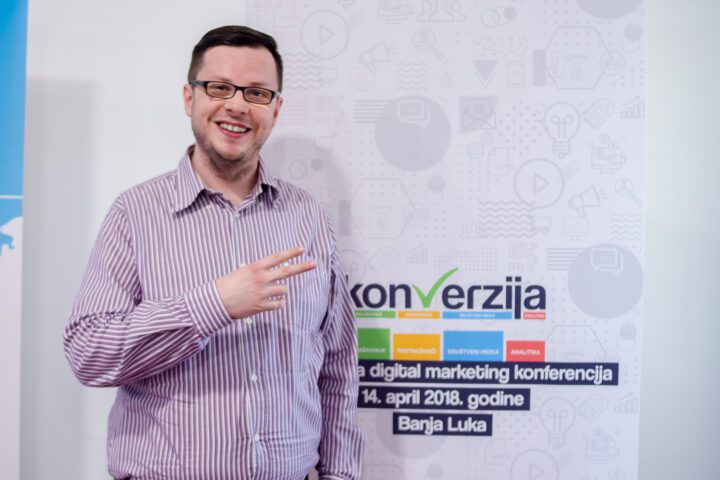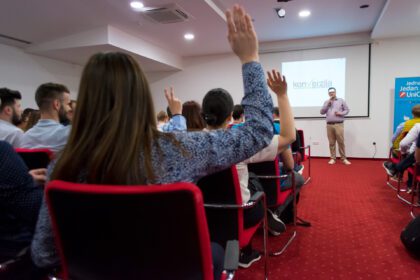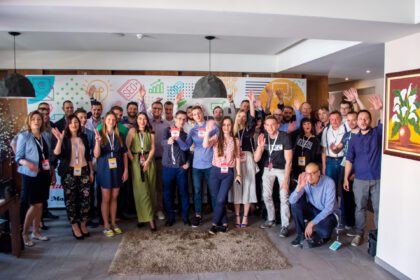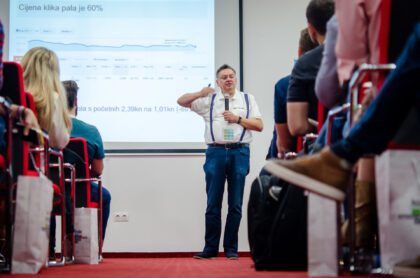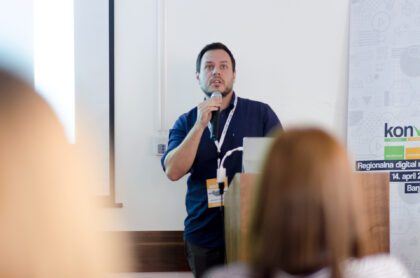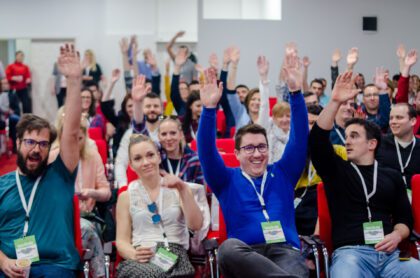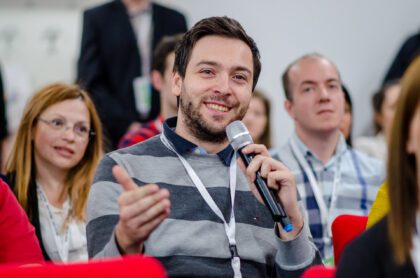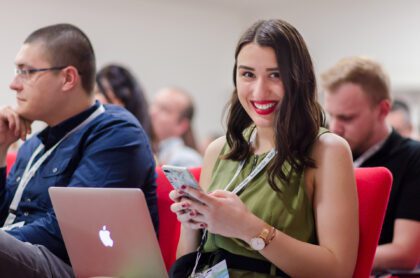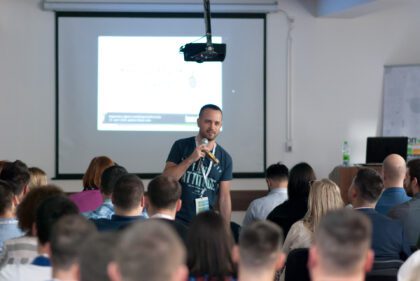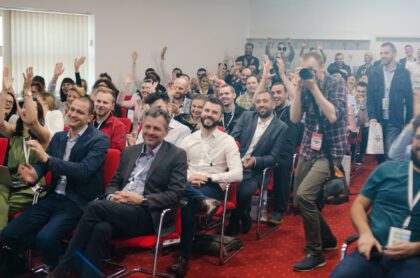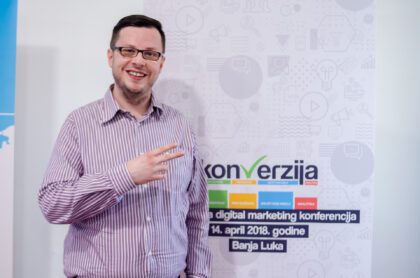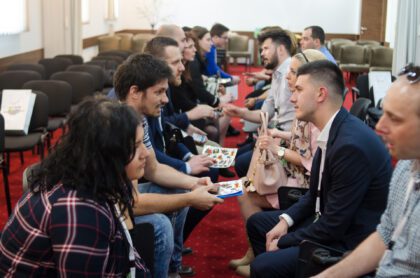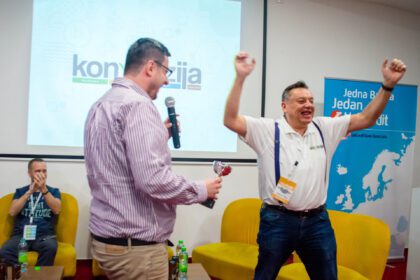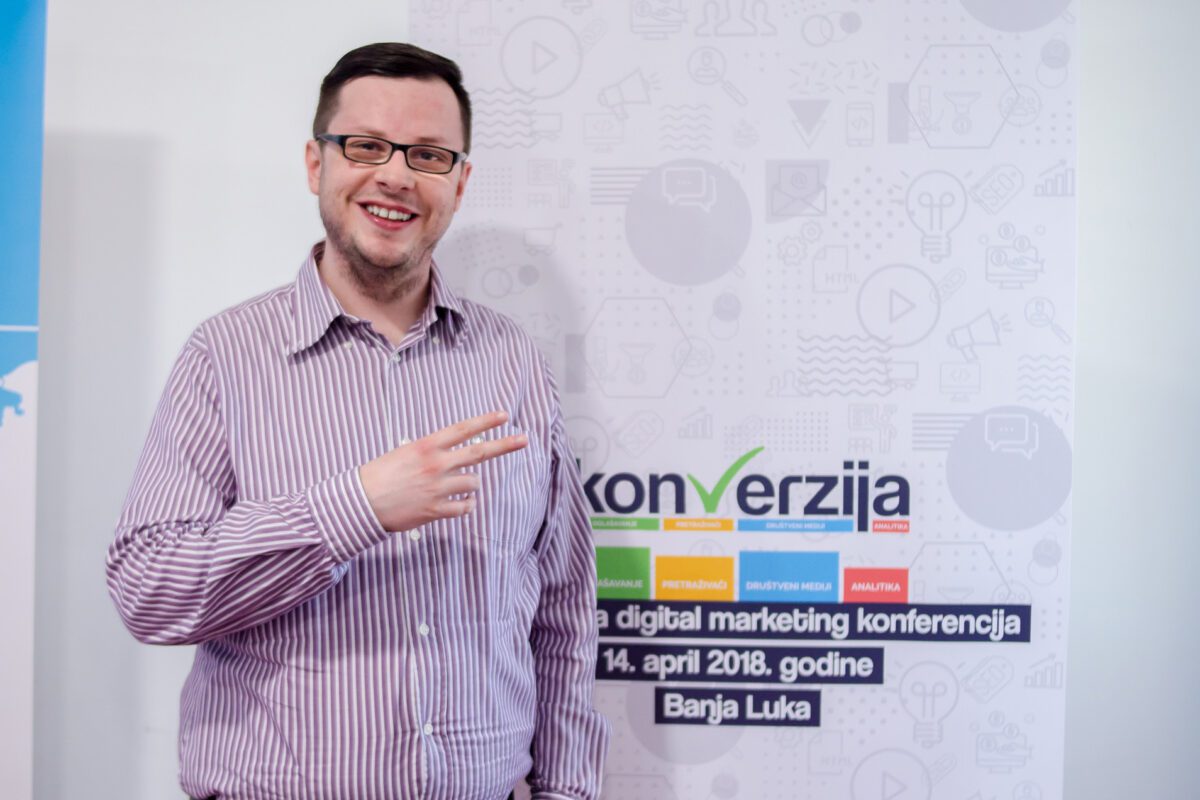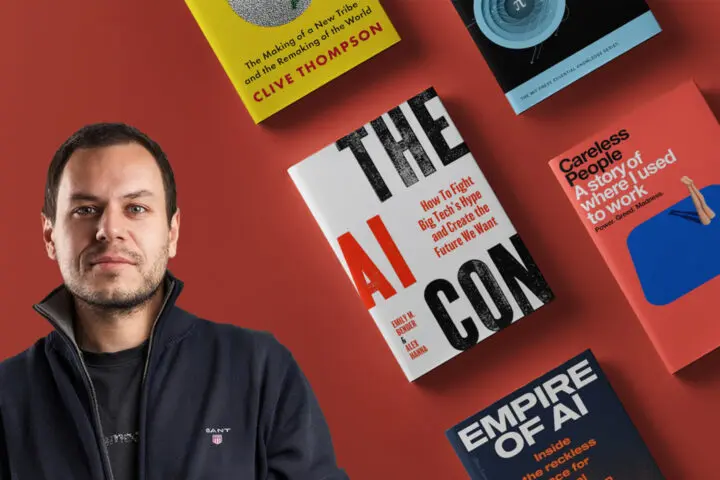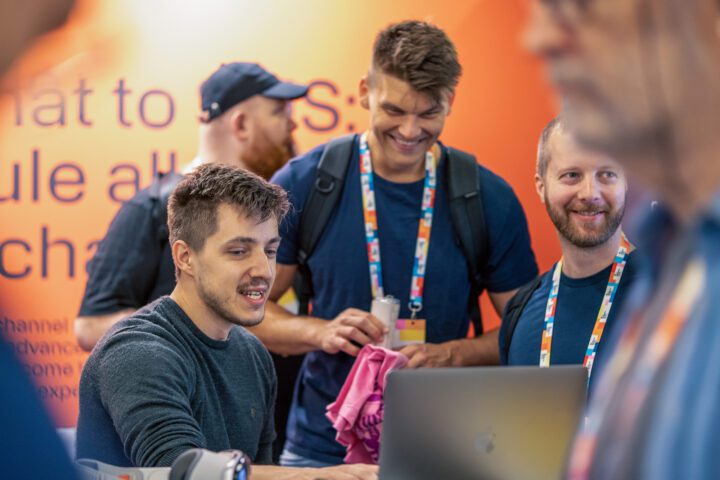Konverzija 2018 Banja Luka overview & interview w. Nedim Sabić
Are you tired of noisy conferences, posh lecturers, and puff pastry hot dogs for lunch? Of course not – any event is a day outside the office! But there is also another, more intimate conference side, and Konverzija in Banja Luka is one of the best examples.
It seems like the whole region is engaged in the events business. Not a week passes by without an IT gathering (not to mention GDPR events that are all over the place). Jump, DK, WMF, Ladies, Reboot, OMGCommerce, LEAP … the quantity of events reflect the optimistic state of the industry, but what about the quality and program of these conferences? The vast majority of them will only satisfy juniors – just ask anyone who goes to WMF or ‘Dani Komunikacija’ – they mildly smile at the question “so, what did you learn today?”
Konverzija strives to change that – one of its main aspects is the specialization for digital marketing and its impact on eCommerce. We talked to its co-founder Nedim Šabić (next year we are doing an interview with another co-founder – Nemanja Krecelj) hoping for an “introspective” review of the neighboring event.
Hello Nedim, let’s start with a test – can you explain ‘Konverzija’ in one sentence?
‘Konverzija’ is a conference revolving around digital marketing. Its goal is to raise the standard of regional conferences. It puts an emphasis on unselfish sharing of practical knowledge through brilliant and highly qualified speakers, without sponsored lectures.
What is the goal of Konverzija and what’s the concept behind the program?
The goal of ‘Konverzija’ is to share knowledge unselfishly. Practical knowledge, which every participant can apply immediately in their digital marketing workflow. We divided this year’s program into Google and Facebook topics. We covered SEO, Adwords, and Analytics under Google umbrella, while on the Facebook side, we included Facebook and Instagram ads. Naturally, there were also email and affiliate marketing topics, as well as multichannel and omnichannel analytics.
The entire event is promoted as “regional”, so I am curious – how do you evaluate the state of neighboring countries when it comes to digital marketing and eCommerce?
It is difficult to evaluate the situation in the region because reliable statistical information is slim to none. Subjectivity on this topic is not very professional. But what I can say is that the niches of the industry are slowly waking up. It’s sort of a cat-and-mouse game. When one of the big players gets serious about a certain aspect of digital marketing, other giants wake up and the competition begins.
As far as eCommerce goes, there is an increasing number of online stores, but unfortunately, most of them operate in a grey area because local people still prefer to pay cash on delivery. Although this mindset is slowly changing with Millennials or Generation Z who are becoming serious shoppers. There is plenty of room for new online shops for sure.
You are currently working in Germany on major SEO projects. Can you compare work differences of the region and Germany?
I think this is common knowledge. In the Balkans, SEO is mainly done by an individual or digital agency, which is in charge of a myriad of other tasks. In Germany, companies have special SEO departments, and there are many agencies that deal exclusively with SEO. SEO involves more and more gimmicks every year, so the scope of the required knowledge is broad, from technology insights to project management.
Speaking of Germany, Adidas CEO announced that they will no longer open so many new stores and that they are completely turning to eCommerce. He anticipates revenue growth up to 4 billion euros and hiring 200 new people. Do you believe that current creators and industry experts can manage such demanding numbers and systems? I know Adidas is hardly comparable to the region, but can you obtain here the knowledge for that kind of production scope?
These figures may seem bombastic at first glance, but those who understand the market will even criticize Adidas for investing so little time and resources into something so crucial. Many Adidas-size companies hire 30-40 new “digital marketing people” per week. Therefore, the 2 billion euros budget is often found as insufficient. In recently held political elections, Germany had two important objectives – resolving refugee crisis and digitization. They realized they are lagging in this process, so investments in digitization and electric cars will be on the rise for sure.
When it comes to the skill set of regional workers – they can easily be compared to Germany. I often see examples of people from the Balkans who underestimate their knowledge and experience, thinking they don’t stand a chance in foreign markets. Oftentimes they get a rejection for a job because they are overqualified! What domestic workforce undoubtedly lacks are good working habits! In my experience, this is because of prematurely diving into work and not measuring success, or asking themselves about the end goal.
The conference program indicates that nowadays digital marketing is generally divided into two advertising ecosystems: Google and Facebook. Do you consider this as a direction in which the digital marketing sector will specialize? Why did you set “tracks” in that particular way?
These are currently the things that experts in our region have to deal with because clients still do not understand other marketing channels. Video as a medium is slowly being activated, so Youtube is becoming more and more interesting. Also, the market is starting to realize that one of the most valuable assets is the email list. Although we discussed chatbots a lot, we noticed that the interest and their application on the Balkans is still very low. In the western countries, unavoidable topics would be Kickstarter campaigns, Amazon SEO, app marketing etc. However, because of the market situation, a more interesting topic is dropshipping and marketing channels that can effectively improve sales, such as Facebook ads, Adwords ads, and SEO.
‘Konverzija’ took place in mid-April, following the big Facebook Cambridge scandal and during the web adaptation to GDPR? How do these topics relate to conference lectures?
We talked a lot about them on the panels, although domestic legal regulations on the Internet, in general, are not at the desired level. Many of us work for foreign clients or sell products on the markets affected by these two major issues. Both topics will affect one important thing for digital marketers: Facebook will most likely remove some very useful options, such as uploading emails to create custom audiences or sharing Facebook pixels with others. Also, email marketing will definitely change and will become more strict. It is yet to be determined how will the market respond to this.
I noticed that Konverzija is tailored towards expert topics and senior-level visitors. What is the reason for this?
We are primarily organizing ‘Konverzija’ for ourselves, to learn something new and to have a great time while exchanging experiences. In our opinion, our lectures are at an intermediate level. We’ve seen there are lots of good conferences for beginners, where they can adopt basic knowledge. However, things & topics are repeated in such conferences and we often hear what we already know. We wanted to give the participants an example of everything they could do and apply in practice which will encourage them to learn more. In our industry, if you stop learning you stagnate! And if someone shows you the world of new opportunities you will most likely respond very positively. So your curiosity awakens and you quickly adapt and upgrade that knowledge.
To what point can someone even be an expert today? Take for example search engine optimization (SEO); today, this is a highly multidisciplinary topic where it is necessary to work with developers, copywriters, clients, and designers in order for all to be well orchestrated. Are today’s experts actually managers who have to align their entire team of creators?
As I already mentioned, the position of an SEO expert is really so diverse and spread out that it is really fascinating. However, the title of an expert is very controversial because everyone can be self-proclaimed as an expert and there are still no university majors dealing exclusively with this, although it is only a matter of time when this will happen.
It is true that because of this multidisciplinarity there are job descriptions called “Technical SEO Expert” or even within niches – “SEO for real estate” because the particularities of certain niches are so different that it is possible to specialize for them. So in Germany, you have “Seo for Jerseys”, “Seo for Tourism”, “Seo for Recipes”, “Porn SEO” etc. In a similar way, Facebook has “T-shirt Facebook Lead Expert” or “Facebook Branding Expert” etc. Adwords on the other hand, still have no such divisions.
An important topic in this segment is a constant creation of new jobs, such as Influence Marketing Manager, Youtube Media Buyer, Native Advertiser, etc. Segregation and market segmentation is happening on a daily basis, and it is up to us to learn how to react quickly. Perhaps this could be an advantage in our regional market. The fact that we have been asleep for so many years might not be so important if we shift gears and carry on with full steam ahead. This opportunity needs to be taken by everyone individually, and in no case should you rely on the system or state to do it for you.
Are there any opportunities left for one-man bands?
There is always room for one-man-band. Creativity has no limits and inspiration constantly flows around us. If you listen good enough, take this information and combine it with a different, fresh method – you can do wonders. Such attempts can always serve as a reference, even if they fail. Every failure is appreciated because it’s sometimes more important to know how something cannot be done. It’s the same with one-man-band, if you do not try, you will not know if it can be done and you will regret it. If you try and fail, you can learn a lot.
Which lectures and topics were most popular? Do you feel that you have hit the right note regarding the program and topics?
This is the hardest part of a conference and one of the hardest puzzles out there. For the second year in a row, we were surprised that we hit the exact right note for the domestic market, based on the participants’ reactions and surveys. We feel relieved and can say with pleasure that we have succeeded! You can rate the quality of a lecture by the number of people in the hallway when the lectures are on-going. As an organizer, I have constantly changed tracks to see if everything is okay and I can tell you during some lectures I did not find a single soul outside.
In 2018. we’ve also managed to offer even more networking opportunities, which is just as important to us as the lectures themselves. The party was definitely better this year, but we’re going to do even more to make unique events (such as “business speed dating”) unforgettable next year. Although people from our region are socializing easily and quickly, the respect they have for certain lecturers, stops them to approach those people and engage in conversation. In the future, We will try to break this ice even further.
Also on that note … which conference is your role model, and what type of conferences do you avoid?
This changes from year to year, but Germany’s SEO-Day conference is great! Their founder held a lecture at ‘Konverzija’. I like conferences that try to make a mix of foreign and domestic experts and have the atmosphere of so-called Barcamps. I avoid all the conferences where it’s important to be seen and with nothing new to learn from them. I simply do not have the time or energy for that.
I should emphasize that there are still many people, who don’t go to conferences because they are convinced they will not learn anything there. These are often people who know a lot but are stagnant because they are obsessed and immersed in their mini-cosmos. This is not always a bad thing, but they forget that networking is an extremely important part of a conference and business in general. It’s fun to meet a new person with whom I can later exchange information and experiences at a higher level on a regular basis. Or when I enhance the relationship with someone I already know.
One of the major announcements for 2018 technology were Chatbots in eCommerce. What technologies and applications do you foresee for the next Konverzija?
I think the focus will remain on eCommerce, mostly because of the rise in drop-shipping businesses. Along with that, Alibaba / AliExpress is coming to Europe and will provide much faster logistics for its products. This will probably change many things on the domestic market and create an even higher pressure for Amazon in Western Europe.
What is waiting for us in the next conference year? Are you staying at the same place?
Banja Luka definitely remains the place where Konverzija will be held. It is equally distant from all three major cities by car (so nobody has excuse for not visiting us). Besides that, Banja Luka is a wonderful city with very pleasant people. We have a mayor who has an ear for what we do and he always holds an interesting IT-themed talk during the welcome part of the conference.
This year we were completely full so we are thinking about moving to a bigger and more elegant space. As far as content goes, we’ll try to have even more international lecturers, who will present their knowledge and experience in English. Additionally, this year we held two all-day workshops after the conference as a part of the Konverzija, and next year we plan to increase the number of such workshops because impressions of participants are more than excellent.
It is important to maintain a team spirit that runs among the organizational team, which was yet again great. None of this could have been achieved without the team.
Ok, thanks for your time Nedim! As for the rest of you folks, keep an eye on the #NeuralabTour2018 blog posts and find out what’s next in the world of web development, digital marketing and interactive design.
Translation and lecture: Bruno Zagroščak & Svjetlana Fučić
Photo credits: Enis Muslimović & Aleksandar Čavić


